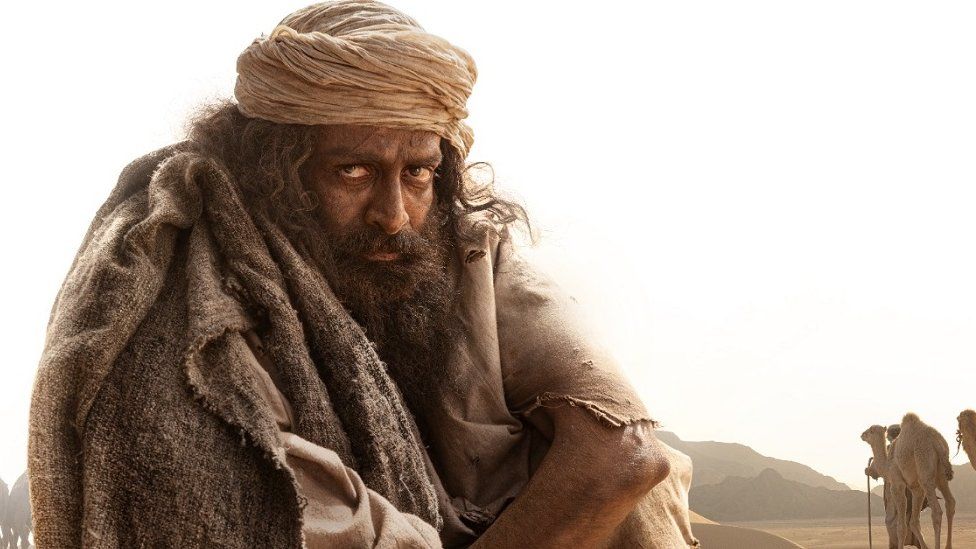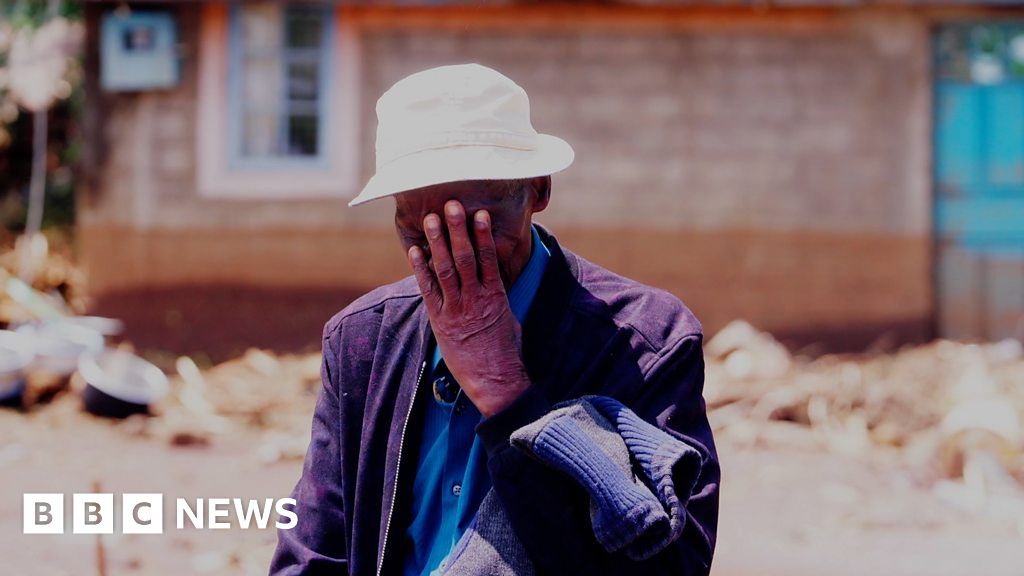 Image source, Aadujeevitham
Image source, Aadujeevitham
Aadujeevitham tells the story of an Indian emigrant to Saudi Arabia, who goes missing and is forced into slave-like labour
By Meryl Sebastian
BBC News, Kochi
A Malayalam-language film that depicts the plight of impoverished Indians seeking jobs in the Middle East has been drawing throngs to cinemas.
Aadujeevitham (Goat Life), adapted from the bestselling 2008 Malayalam book, stars Prithviraj Sukumaran as Najeeb, an Indian immigrant in Saudi Arabia who is kidnapped and forced into slave-like labour as a goat herder in the desert. The story is inspired by the real-life ordeal of a man with the same name, who was abducted in the country in the 1990s and managed to escape after two years.
Written as a gripping thriller, the book has become a cultural cornerstone in the southern Kerala state, with its 250th edition released this year. Its widespread acclaim had sparked a conversation on the harsh realities of migrant life in the Gulf.
The three-hour film has also done exceedingly well, grossing over 870 million rupees (£8.23m, $10.4m) worldwide in the first week of its release. Critics have called it a "stunning survival drama" and a much awaited "cinematic portrayal of brutal struggle".
Aadujeevitham shows Najeeb isolated from the world, alone with his master and his animals, facing extreme heat in a harsh desert, miles away from the nearest road, with no access to a phone, paper or pen to write with, and no one to call a friend. He drinks water from the same trough as his animals.
Image source, Aadujeevitham
Image caption,The film is inspired by the real-life ordeal of a man, who was abducted in Saudi Arabia
"Please let me go back," he pleads in a a heart-wrenching scene, tears streaming down his face as he recounts selling everything and leaving his family behind, all in pursuit of a promised job.
His words in Malayalam mean nothing to his boss, who only speaks Arabic.
Among the 2.1 million people from Kerala living abroad, nearly 90% migrated to the Gulf countries, drawn by the state's longstanding relationship spanning over five decades with nations such as Bahrain, Kuwait, Oman, Qatar, Saudi Arabia, and the United Arab Emirates in the Arabian Peninsula.
Many of these workers from impoverished families have toiled under the kafala system in these countries, where their stay and mobility are controlled by their sponsor, leaving them susceptible to abuse and exploitation. The pay the workers have sent back to Kerala has powered its economy - a government think tank index showed that the state has the lowest poverty rate in India.
Much has been written about the oppressive working conditions in the Gulf countries.
"Your passport is taken away, you cannot return, you are constantly under the threat of death," says Mohamed Shafeeq Karinkurayil of Manipal Centre for Humanities, who has researched labour migration.
In a conversation on YouTube, Najeeb, on whose life the book and the film are based, says he could never return to the places described in the story.
Image source, Aadujeevitham
Image caption,The film has grossed over 870 million rupees (£8.23m, $10.4m) worldwide in the first week of its release
"I had left [Kerala] in 1991 with a lot of dreams. The experiences I had there, the horrible master and the life among goats - I lost my self-consciousness, I lost my mind," he says.
In 2008, film director Blessy acquired the rights to adapt the book. Sukumaran told the BBC that he believed he knew everything about the book when the director handed him a copy next year.
"I knew all the events in the story. That was how much people were talking about it, especially in the film industry. Even then, it blew me away."
"A standout feature of this story is this diffusion of identities between man and animal - this one man slowly losing his identity as a species, as a human, and becoming one among the animals. I had never read anything like it."
In the film, Najeeb gradually stops speaking in Malayalam, only making guttural sounds like the animals he tends to. From time to time, he dips into a jar of mango pickle he'd brought from home for a taste of comfort.
After a 16-year wait, Aadujeevitham hit screens, overcoming obstacles like high costs, production setbacks, and the pandemic, with the director investing his savings to make the film
Blessy, who called the film a passion project, said he chose to adapt just 43 pages from the novel "to capture the essence".
On the weekend of its release, people either talked about having watched the film or booking tickets to watch it. YouTube channels showed people leaving the cinema in tears, with many saying it was an extraordinarily emotional experience.
"I know the story well but almost felt like I shouldn't have watched the film - that's how painful it was," one woman said.












 English (US) ·
English (US) ·  Turkish (TR) ·
Turkish (TR) ·